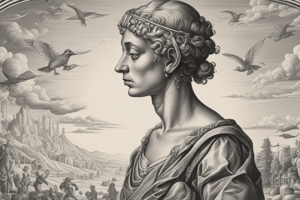Podcast
Questions and Answers
What is humanism and how did it affect the Renaissance?
What is humanism and how did it affect the Renaissance?
Humanism is a worldview and a moral philosophy that considers humans to be of primary importance. It first thrived in 14th century Italy and influenced art, writing, education, and thinkers during the Renaissance.
Was Shakespeare a humanist?
Was Shakespeare a humanist?
True (A)
When did humanism start in the Renaissance?
When did humanism start in the Renaissance?
Humanism began in late-14th-century Italy, matured in the 15th century, and spread to the rest of Europe after the middle of that century.
Was Shakespeare part of the Renaissance?
Was Shakespeare part of the Renaissance?
What event started the Renaissance?
What event started the Renaissance?
Who was the most famous humanist in the Renaissance?
Who was the most famous humanist in the Renaissance?
Was Shakespeare a humanist?
Was Shakespeare a humanist?
What is humanism and how did it affect the Renaissance?
What is humanism and how did it affect the Renaissance?
What were the characteristics of Renaissance humanism?
What were the characteristics of Renaissance humanism?
How was humanism important to the Renaissance?
How was humanism important to the Renaissance?
Flashcards
Renaissance Humanism
Renaissance Humanism
A worldview emphasizing human importance and values, shaping the Renaissance.
Humanism's Origin
Humanism's Origin
Started in 14th-century Italy, spreading across Europe by the 15th century.
Shakespeare and Humanism
Shakespeare and Humanism
Shakespeare's works reflected humanist ideas and cultural shifts of Elizabethan England.
Humanism's Influence
Humanism's Influence
Signup and view all the flashcards
Renaissance Period
Renaissance Period
Signup and view all the flashcards
Humanist Influence on Education
Humanist Influence on Education
Signup and view all the flashcards
Importance of Humanism
Importance of Humanism
Signup and view all the flashcards
Juan Gines de Sepulveda
Juan Gines de Sepulveda
Signup and view all the flashcards
Humanist Artistic Focus
Humanist Artistic Focus
Signup and view all the flashcards
Timeline of European Humanism
Timeline of European Humanism
Signup and view all the flashcards
Study Notes
Humanism in the Renaissance
- Humanism emerged as a worldview prioritizing human importance and values, significantly influencing the Renaissance era.
- Originated in 14th century Italy, humanism expanded across Europe by the 15th century, impacting art, writing, and philosophy.
- The movement encouraged a shift in focus from divine to human experiences and achievements.
Shakespeare and Humanism
- Shakespeare is regarded as a Renaissance humanist, evident from the themes and content of his plays.
- His works reflect the cultural and intellectual transformations occurring in Elizabethan England during the Renaissance.
- Shakespeare's engagement with humanist ideas contributed to the richness of his literary output.
Timeline of Humanism
- Humanism began as a dominant intellectual movement in late-14th-century Italy and matured in the 15th century.
- The spread of humanism across Europe occurred after the mid-15th century, influencing various fields including science, philosophy, and literature.
Cultural Shifts and Renaissance Events
- The Renaissance was catalyzed by periods of relative peace and conflict, creating an environment conducive to cultural growth and artistic expression.
- The changes in society during this time facilitated the exploration of new ideas and the elevation of human experience.
Notable Humanists
- Juan Gines de Sepulveda is recognized as one of the most famous humanists of the Renaissance period, contributing significantly to the humanistic discourse.
Characteristics of Renaissance Humanism
- Renaissance humanism emphasized the beauty of the human form in art, reflecting the belief in human potential and achievement.
- The principles of humanism affected education, introducing classical texts and a new focus on the humanities.
Importance of Humanism
- Humanism marked the beginning of the modern age, promoting a lifestyle centered around human interests and rational thought.
- Its influence is evident in various facets of Renaissance life, from artistic endeavors to political theories, such as those articulated by Machiavelli.
Studying That Suits You
Use AI to generate personalized quizzes and flashcards to suit your learning preferences.




